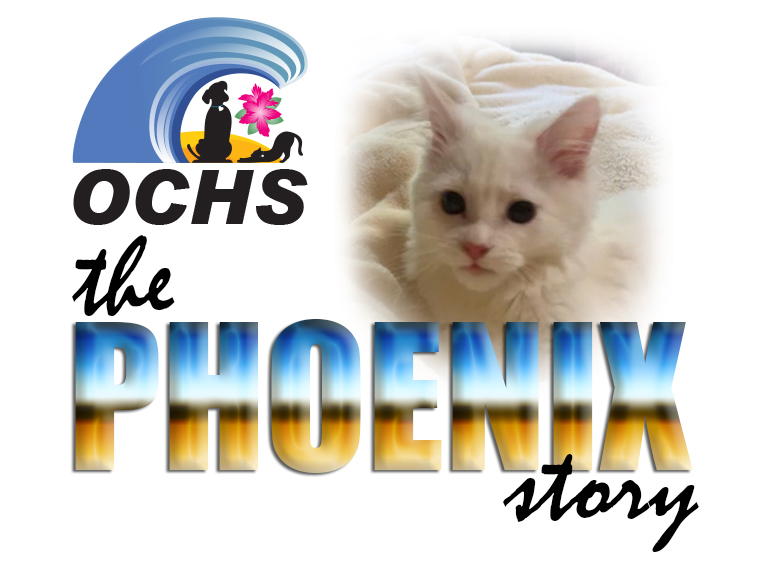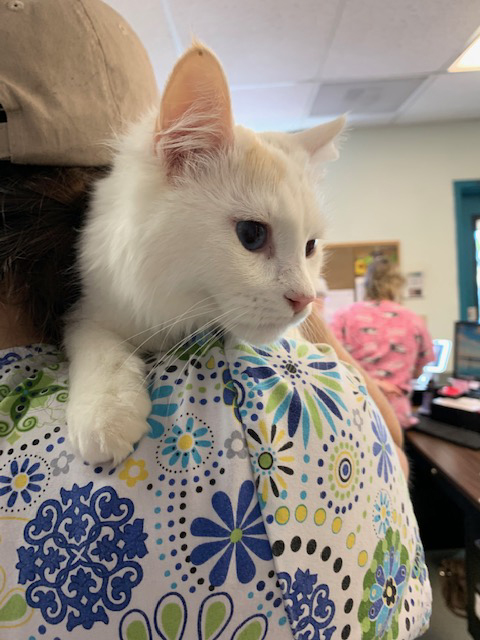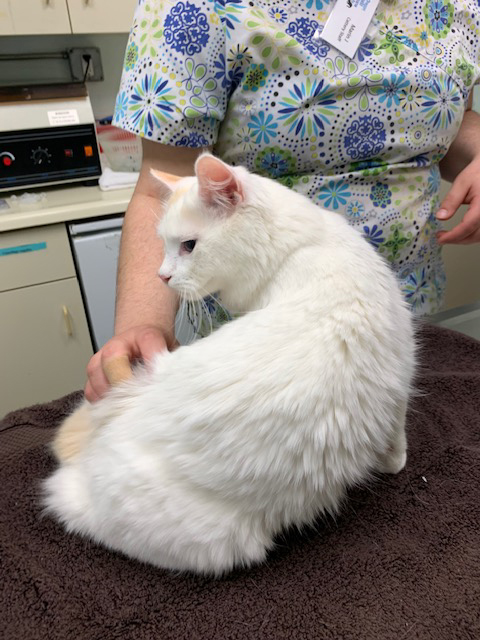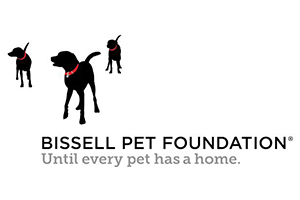(541) 997-4277
info@oregoncoasthumanesociety.org
Open Daily 10 a.m. - 5 p.m.
- Shelter Stories...
If a timeline were to be made of all the events in Phoenix’s nine months of life so far, a very long piece of paper would be needed! Found lying in the middle of a backcountry dirt road in terrible straits after a violent encounter with a vehicle, recovered by a tender-hearted animal lover and nursed back to health by some of the best caregivers anywhere. Three surgeries to repair his injuries and keep him healthy, and finally adoption by a loving family who are dedicated to giving him a safe home with all the special attention he will need. Phoenix is aptly named. This is his success story.
The driver of the truck puzzled over what the white dot in the middle of the dirt road could possibly be. The isolated county road between North Fork and Mapleton didn’t see much traffic or trash, so what could that be? Maybe somebody lost a gym sock. Strange place for it though.
As the driver got closer, he realized that it was not a sock at all. It was furry…alive but not moving. It was a kitten. As a volunteer at Oregon Coast Humane Society, the driver knew exactly what needed to be done. He stopped his truck and went back for the little guy. He carefully lifted the dirty cream-colored ball of fur off the road. With the kitten on his lap, the driver forgot about his original destination, made a quick u-turn and headed to the Oregon Coast Humane Society’s shelter.
A quick assessment by the shelter staff concluded that the kitten had either been hit by or thrown from a car. He (the kitten was male) was filthy dirty, dehydrated, underweight and had a bad case of worms. It was apparent that he had injuries to his hindquarters, his right front paw and his mouth. The shelter staff warmed him up and worked to stabilize him as far as they could. He needed to be seen by a veterinarian right away. Better call David.
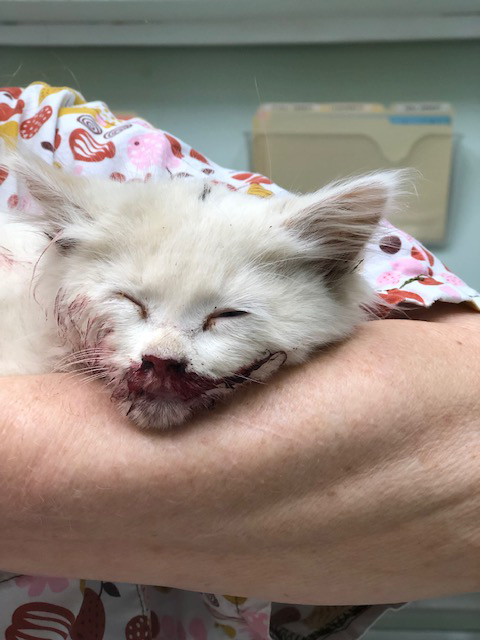
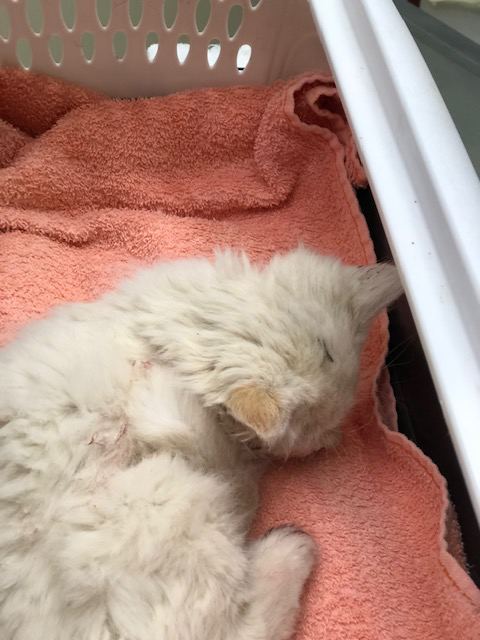
David, one of the shelter’s valuable volunteers, is a very big man who has the lightest of touches with the tiniest of animals. When asked if he could drop everything and rush a critically injured kitten to the Veneta Veterinary Hospital, he didn’t hesitate a second. The shelter staff prepared the kitten for transport. David arrived, loaded him up and hit the road for the forty-nine mile drive to Veneta.
In the Veneta vet’s judgment, the kitten’s prognosis was poor, his condition “guarded”. He was only nine or ten weeks old. A vertebra in his lower back had been fractured and his lower jaw was broken. In spite of the vet’s misgiving about the kitten’s chances, no one was ready to give up on him as long as there was a chance he could weather this.
A surgery the following day wired the jaw back together. Together, not shut. His lower jaw was wired to hold it together so it could heal, but he could open his mouth to eat. He wouldn’t have to be bottle-fed during his recovery. That was good news.
There was good news about the spinal fracture as well. It was low enough in his back that it did not affect his bladder or bowel function or his back legs. The bad news, however, was that the nerves and blood supply to his tail were compromised. Amputation of his tail was added to the treatment plan.
Upon his return to the OCHS shelter, the kitten was placed in foster care with one of the most experienced staff members. She kept a twenty-four hour vigil with him for the first several days. Holding and walking with him, hand feeding him, bringing him to work. Staff & volunteers alike checked on him frequently to monitor his progress. Everyone familiar with his plight waited anxiously for him to “turn the corner”.
And turn he finally did! Each day this little fighter ate a good deal more and grew a lot stronger. As food started sticking to his ribs, he began gaining weight. He became ever more lively and vocal. After a little more than two weeks of exemplary care, he was not a “guarded” kitten anymore. He became a fluffy, buff-colored dynamo! He ran. He jumped. He pounced on anything that moved. High-spirited and full of personality…when his humans needed him, he hid. When they were busy, he was under their feet and into everything. He learned to take the kitten job description seriously: Be cute and create mayhem.
In six weeks time, the vet decided, he would need surgery once again to remove the wire from his jaw and amputate most of his tail. He had youth on his side and would quickly learn to compensate for that loss. Thankfully, the right front paw, which caused concerned when he was first found, healed and showed no further damage.

The kitten needed a name. How do you pick a name for a tiny cat that, at only three months of age, has already experienced such an arduous journey? What do you call a feisty little puffball that defied all the odds and won so many people’s hearts in the process? What else? PHOENIX
Not six but nine weeks later, on September 18, 2019, Dr. Schaad (the in-house vet at OCHS) removed the wire securing Phoenix’s jaw. It had repaired itself flawlessly. The tail however, was another story. There was no way to save any of it, so Dr. Schaad amputated it close to the end of his spine. Phoenix may have lost his damaged tail, but he now has a healthy nub.
By December of 2019, it was time for Phoenix to be neutered. As a rule, neutering a male cat is a pretty routine operation. With Phoenix, however, nothing was routine. Dr. Schaad discovered that Phoenix was a double cryptorchid…neither of his testicles had dropped and were, in fact, lodged high up somewhere in his abdomen. Once again, Phoenix had to go “under the knife”. This surgery turned out to be a two-hour “fishing expedition” as Dr. Schaad patiently and methodically went in search of Phoenix’s elusive testicles. Finally found and removed, Phoenix is now like every other kitten in the Shelter.
Or is he?
Now that Phoenix has had a chance to mature and fill out over the last eight months, he is sporting a thick, luxurious longhaired coat of not buff, but white fur. His kitten-blue eyes have deepened to a clear and bright sapphire blue. His foster family has officially adopted him, and he fits in well with the other special needs animals in their care. His best friend is an Australian shepherd puppy with whom he has bonded through their hours of play together.
The term “special needs” does apply to Phoenix. He has overcome the physical ordeals of his young life like a champion, however (and unfortunately) he has some neurological damage that must be closely monitored. Phoenix has no sense of danger. Fearlessly, he plunges into unsafe or dangerous situations with no clue that he is in trouble. It also appears that he cannot feel hot or cold. He never knows when to pull his paw away.
- ShelterOpen 7 days a week, from 10 a.m. - 5 p.m.Employer Identification Number (EIN) 93-1079548
- Open Monday - Saturday from 10 a.m. - 5 p.m.Sunday from 11 a.m. - 4 p.m.

